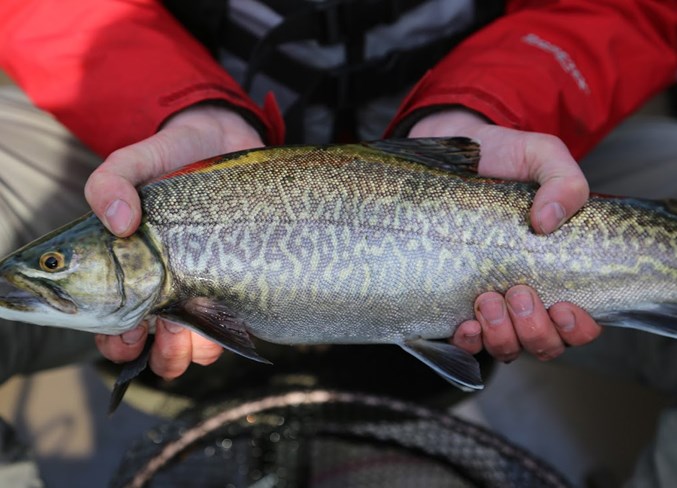The province is taking a look at fish management in Alberta, after years of advocating from Lakeland anglers.
Earlier this month, local volunteer fisheries biologist Ray Makowecki, and members from the Next Step Team and Volunteer Biologists Group, met with Alberta Environment and Parks Minister Jason Nixon to discuss fish management across the province.
“We’ve been trying for several years to meet with the minister, because we’ve met with the biologists and staff and it appears we just haven’t been able to advance the changes that people are seeking in terms of managing and using the fish stocks,” expressed Makowecki.
In addition to their meeting, representatives from the two organizations, the Next Step Team and Volunteer Biologists Group, discovered an MLA Caucus Committee to review fish management had been formed.
“That was really encouraging to see that there’s a committee that has already been struck,” Makowecki said.
Bonnyville-Cold Lake-St. Paul MLA David Hanson is among the members of the caucus.
Makowecki noted, “We’ve finally had some attention from the government in what I consider a pretty significant way.”
According to Makowecki, the Next Step Team and Volunteer Biologists Group are made-up of concerned citizens. They represent organizations, municipalities, businesses, and non-government biologists looking to improve fisheries management in Alberta.
“The Next Step Team is more of a public group. It has fish and game clubs, but it also has several municipalities that are a part of it as well as sporting good stores and the general public and anglers,” he noted, adding the second group is made-up of volunteer biologists like himself.
The Next Step Team was created following public meetings over three years ago, where locals expressed their frustrations over the province’s fishing regulations.
“They were all expressing the same thing. They were concerned; at the time, we called it under-utilized walleye numbers, there were lots and lots of walleye all over the place. It was province-wide. It wasn’t just northeast or central Alberta, but the emphasis came from our group. From that, this Next Step Team was conceived,” described Makowecki.
Makowecki said during their meeting with Nixon, they outlined what they believed were some of the problems, while also offering solutions.
“The number one (issue) was that anglers were dissatisfied with the regulations under the harvest of walleye and declining pike, perch, and lake whitefish populations… We talked about the restricted and complicated regulations; people having a hard time using them and understanding how you purchase tags, that whole bureaucracy was a big concern,” continued Makowecki.
They also touched on communication with the public and “the declining interest in angling.”
Makowecki continued, “I think the concern from a lot of our municipalities is that people just aren’t coming. The angler numbers in the last three years have declined almost 40,000. A lot of the comments are people are going to Saskatchewan because people are no longer fishing in Alberta.”
City of Cold Lake Mayor Craig Copeland explained how Alberta, specifically the Cold Lake area, has seen a dip in tourism relating to fishing.
“The significance of tourist dollars leaving Alberta to go fishing and camping in Saskatchewan is significant. We know we’re losing money locally with anglers going east,” he expressed. “Saskatchewan, what they’ve done is increase the fishing license for Albertans to fish in Saskatchewan because there are just so many people going to Saskatchewan. There’s a definite bleed of money that’s not coming into our area, but going into Saskatchewan.”
Out of all of the solutions offered to the minister by the two groups, Makowecki highlighted the need to change direction.
“You have to be sustainable of course, you don’t want to hurt a resource, and it has to be a long-term sustainability, but it appears we’re off track a fair bit here.”
Whether it’s cormorants or commercial fishing, Makowecki stressed the importance of balancing “some of the predation that does occur,” with recreational use.
“There has to be some management of those predators so we can allow users to use the resources in a reasonable way,” he added.
The groups recommended the province adopt a “no net loss of fish habitat policy,” which would ensure fish resources are sustained while allowing for limited industrial and economic development. They feel it will also ensure habitats are protected, developed, and restored.
Fish stocking, simplifying sportfishing regulations, and involving the public in decision making were other suggestions.
“I think they recognize there’s a problem with the current direction with fish management in the province. I think the door is a little bit open in terms of what can be done. I think there’s an agreement that there has to be a new direction with fish management in Alberta, and that’s what we’re hopeful for,” Makowecki noted.
Copeland said, “I think they have to start relaxing the regulations and allowing the removal of fish from these lakes. We’re going to have to find a compromise. You can’t protect all of the lakes in Alberta, we’re going to have to throw the anglers a bone and allow some harvesting of fish through some of the lakes in Alberta.”
In the end, Makowecki is pleased to see the government is stepping up and taking a look at an issue that has been ongoing for a number of years.
“There’s something happening. A minister and a committee are out there looking at fish management and trying to redirect it. I think that in itself has to be a positive,” stated Makowecki. “For the coming 2020 sportfishing season, we would hope there would be some significant changes to the regulations. That’s a short-term/long-term goal; that there be some reassessment and those regulations be re-adjusted.”



